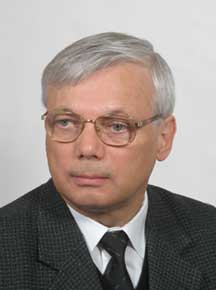

Bogumil Jeziorski

Born April 29, 1947 in Radomsko, Poland.
Professor, Department of Chemistry, University of Warsaw, Poland.
Email:jeziorsk@chem.uw.edu.pl
Web: external link
Laureate of the International Academy of Quantum Molecular Science (1987), Member of the Board of Directors of the International Society for Theoretical Chemical Physics, Member of the Polish Academy of Sciences, Member of the Scientific Board of WATOC.
Author of:
Numerous papers published in scientific journals
Important Contributions:
-
Theory of intermolecular forces
development of symmetry-adapted perturbation theory (SAPT) and the explanation of its convergence properties, discovery and first studies of dispersion-exchange and induction-exchange effects in intermolecular interactions, formulation and computational implementation of many-body SAPT, numerous applications of many-body SAPT to van der Waals clusters and hydrogen-bonded systems. -
Coupled cluster theory
introduction of the state-universal (Hilbert-space) exponential Ansatz for the wave operator, introduction of rigorous unitary group exponential Ansatz for the wave function, spin-adaptation of the open-shell coupled cluster theory, discovery of the relation between the valence universal (Fock-space) cluster operator and the multireference configuration interaction wave function. -
Gaussian geminal theory
development of explicitly correlated many-body theory, first formulation and implementation of coupled cluster theory with explicitly correlated basis, completeness proofs for Gaussian geminal bases, benchmark studies involving Gaussian geminals. -
Theory of exotic molecules
theoretical studies of muonic molecules relevant for the understanding of muon catalyzed fusion, theoretical studies of molecular effects in the beta decay of gaseous and solid tritium relevant for neutrino-mass experiments, theoretical studies of antiprotonic helium, theoretical studies of QED effects in light atoms and molecules.